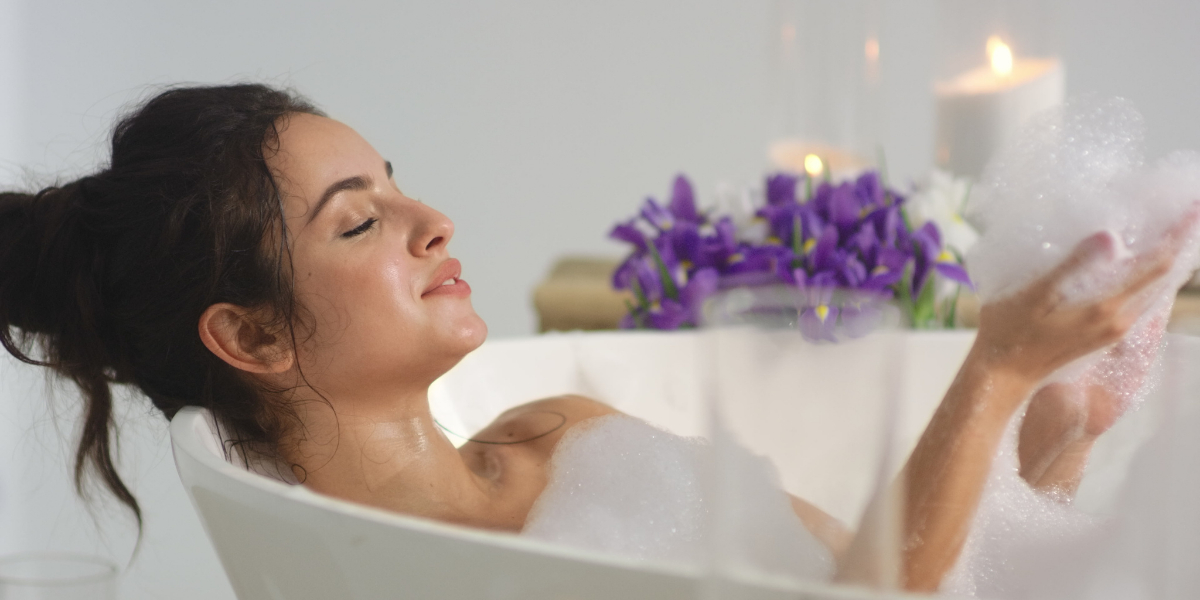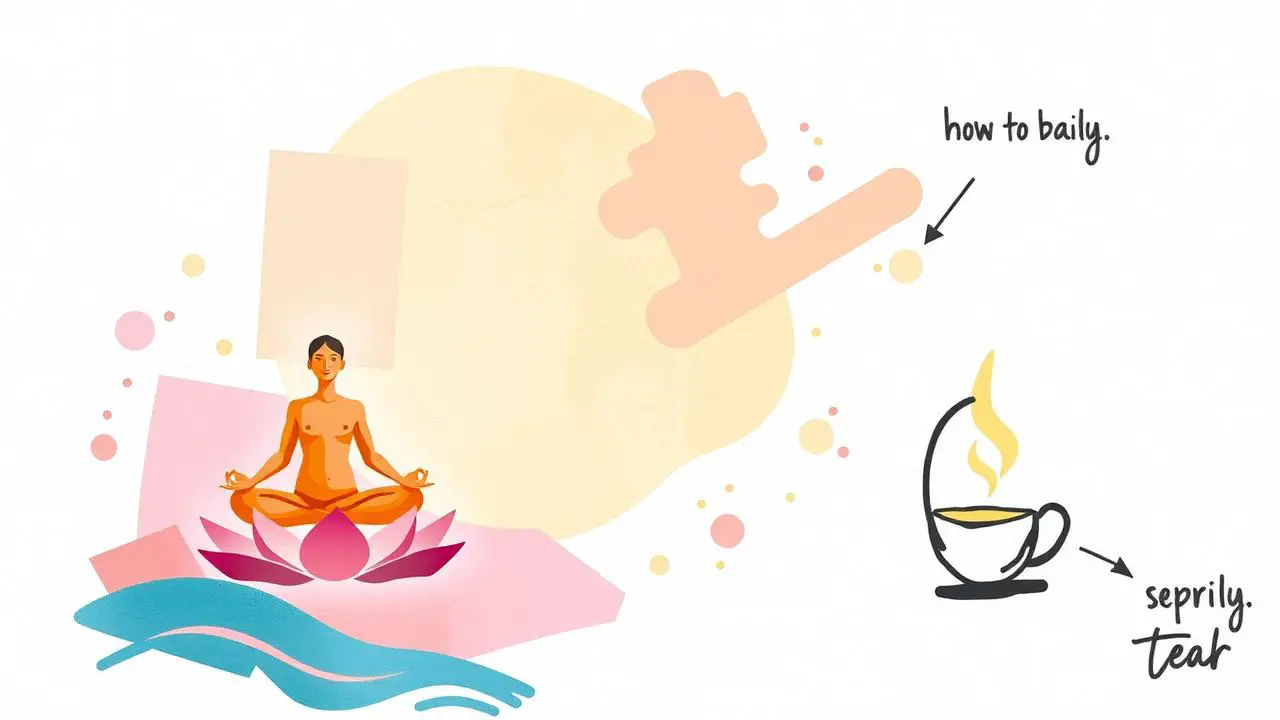Do you feel like you’re constantly on edge and can’t seem to relax? Are your worries and anxieties taking over your life, leaving you feeling overwhelmed and unable to cope?
If so, you’re not alone. Many people struggle with stress and anxiety, making it difficult to find ways to relax.
But don’t despair!
Relaxing when you don’t know how can be difficult and intimidating, but there are a few simple tips that can help. One is to try deep breathing exercises, focusing on inhaling deeply and exhaling slowly. Other relaxation techniques include practicing mindfulness, indulging in a hobby or craft you enjoy, taking a walk or exercising, listening to calming music and having some time alone away from distractions.
These are just some of the simple steps you can take to help reduce stress and find relaxation in life. In this article, we’ll explore 10 easy ways to help you relax when you don’t know how.
From deep breathing exercises to mindful activities, these tips will help you feel more relaxed in no time. So if you’re ready to take a break from the hustle and bustle of life, let’s get started!
What are some simple ways to relax?
When stress starts to build up in your life, it can often seem like there’s no way to relax or let go of the frantic energy around you. Luckily, there are many ways, both big and small, that you can de-stress and recharge! Here are 10 ways to relax when you don’t know how:
- Take a Hot Bath – Taking a hot bath can be so refreshing! Fill the tub with warm water and add some bubbles, lavender oil, or your favorite calming scent. Soak your worries away and just enjoy the moment.
- Listen to Music – Listening to music is an easy way to relax when you don’t know what else to do. Put on some soothing tunes that calm your mind and put you in a peaceful state.
- Journal – Writing down your thoughts can be a great way to clear up confusion and ease stress. Write whatever comes into your head without judgment—it doesn’t have to make sense!
- Practice Deep Breathing – Find a quiet spot where you won’t be disturbed for at least five minutes and focus on taking slow deep breaths from the stomach. Let out all the tension as slowly as possible until it all dissipates and you feel relaxed again.
- Meditate – Meditation isn’t just for monks or spiritual masters; anyone can benefit from taking time out of their day for mindfulness practices such as meditating on compassion or reciting mantras or affirmations of intentionality before beginning their day..
- Stretch/Yoga — Get into physical activity by stretching or doing yoga poses that work with your breath, going in & out with each pose so that the exhale releases any tension more deeply than the inhale brought it in with
- Go Outside — Even if it’s just walking around the block if it’s easier than finding a nature preserve nearby, being outside helps considerably reconnect us with ourselves & our environment since we coexist with nature not separate from it entirely
- Call/text somebody close — Talk closely & kindly with somebody who is close & likely understand what kind of stress we may be under without them having knowledge before hand helps release emotion & feelings which allows for greater mental clarity moving forward
- Unplug — If you’re glued to screens all day long then consider unplugging for an hour (or even 30 minutes) & notice how much calmer everything becomes– social media shouldn’t define us but sometimes we struggle when consumed by its seductiveness constantly
- Prepare a meal — Just prepping simple meals is cathartic as mindfulness about nutrition is important always but especially during times of stress– Eat consciously along side others similarly focused on rebuilding nutritional reserves simultaneously
What are the benefits of relaxation?
1. Improved mental clarity
Relaxation has many benefits that can improve mental clarity. Children who are encouraged to relax tend to be more focused and have fewer social and behavioral issues. Relaxation can improve focus, learning, and cooperation. After a period of relaxation, the mind enters a “hum” state which makes it easier to process information. Relaxation can be achieved through activities such as yoga, meditation, or breathing exercises. Relaxation can be beneficial for both mental and physical health.
2. Better focus
It has been shown that deep breathing exercises can help improve focus and productivity. Mindfulness is a process of bringing awareness to what’s happening in the present moment, which can help reduce stress and improve overall wellness.
3. Prevention of anxiety
Relaxation techniques can help prevent anxiety and provide many benefits. Relaxation can help reduce the intensity and frequency of anxiety symptoms, and it can also help improve overall health and well-being. When people make time for relaxation every day, they may notice a decrease in anxiety symptoms, as well as improvements in other areas of their lives.
4. Better sleep
Relaxation has many benefits, including a more positive outlook on life, healthier body, and resistance to future stress. Exercise can burn off anxiety and excess energy, and help improve sleep. Regular exercise can help you sleep if disrupted sleep is a part of your anxiety. Taking walks every other day can also help you relax and improve your sleep. Sunlight is good for you because it provides valuable vitamin D which can help with the mood-balancing chemicals in your brain.
5. Reduction of stress
Relaxation exercises can help reduce stress and improve mental health. If relaxation exercises are not helping, seek professional help. Exercise can reduce stress as well as the symptoms of depression. Exercise has many benefits including reducing stress levels and boosting feel-good hormones.
6. Reduction in cortisol levels
Exercise can help to lower cortisol levels in the body, which in turn can lead to feeling more relaxed. When cortisol levels are lowered, the body is able to better manage stress. Additionally, exercise can also improve mood and lead to a more positive outlook on life.
7. Reduction in heart rate
Relaxation can help reduce heart rate and blood pressure, relaxed muscles, and returning breath to normal.
8. Reduction in blood pressure
Relaxation has many benefits for the body, mind, and soul. Relaxation can help reduce blood pressure and improve other aspects of health. Encouraging children to relax helps them focus and learn more effectively.
9. Reduction in inflammation
Relaxation has many benefits, including reducing inflammation and symptoms of depression and anxiety. A 2019 study found that progressive muscle relaxation (PMR) improved feelings of well-being, reduced symptoms of depression, and reduced anxiety. A 2020 study found that PMR improved sleep quality and reduced anxiety in 80 burn patients.
10. Reduction in appetite
Relaxation can help reduce appetite and provide other benefits by brain games that require concentration which can take your mind off whatever’s eating you. Trail mix, an apple, or some celery sticks provide a satisfying crunch to curb your spiral.
How can I use relaxation techniques in my daily life?
Step 1: Identify when you need to relax
When you find yourself worrying about the future or feeling overwhelmed, it may be time to relax. There are many ways to relax, but one way is to focus on the present moment.
You can do this by focusing on your breath or by doing a 5-4-3-2-1 exercise, where you name five things you see, four things you feel, three things you hear, two things you smell, and one thing you taste.
This will help you to ground yourself in the present and let go of worry. Another way to relax is to spend time doing something that you enjoy.
This could be reading, gardening, taking a walk, or anything else that brings you joy. It’s important to make time for relaxation so that you can reduce stress and recharge.
Step 2: Choose a relaxation technique
To choose a relaxation technique, begin by focusing on tensing and relaxing each muscle group in your body. For example, start by tensing the muscles in your face, then release them.
Next, tense and release the muscles in your shoulders and neck.
Continue down your body, tensing and releasing each muscle group until you reach your feet. Deep breathing or visualization can also help to relax the body and mind.
Use a relaxation technique regularly to help reduce stress and anxiety.
Step 3: Make time for relaxation
To make time for relaxation in your daily life, you need to set a conscious intention and practice the skills regularly.
Relaxation is a skill that can be mastered through practice and by teaching it to others. The more you can do to improve your relaxation skills, the more effective it will be.
Step 4: Set aside distractions
When you find yourself feeling stressed or overwhelmed, take a few moments to relax. There are many different ways to relax, and you can choose whichever methods work best for you.
Some simple relaxation techniques include looking at nature scenes, listening to calming music, or spending time in meditation.
Taking even just a few minutes to relax can help you feel more calm and focused, and better able to handle whatever challenges come your way.
Step 5: Follow through with your relaxation technique
It is important to follow through with your relaxation technique in order to reap the benefits. Relaxation techniques can help improve blood flow and reduce stress.
When you focus on your breath, it can help to focus and relax the mind and body. Tensing and releasing muscles will also help improve blood flow throughout the body.
It is important to practice relaxation techniques daily in order to see the most benefit.
Step 6: Check in with yourself
Relaxation techniques can help you relax and focus more easily. Taking some time for yourself each day to relax can help you stay refreshed and focused throughout the day.
Step 7: Make relaxation a habit
It is possible to make relaxation a habit in daily life by first focusing on tensing and relaxing each muscle group in the body.
Starting with the face, then neck and shoulders, followed by the stomach and legs, gradually gaining more control over the body and mind until complete relaxation is achieved.
It is also helpful to close the eyes if unwanted thoughts come into the head, and imagine the worries written on a chalkboard.
Wiping them away with a cloth or damp breath can help increase feelings of relaxation.
What are some advanced relaxation methods?
1. Progressive muscle relaxation (PMR)
Progressive muscle relaxation (PMR) is a technique that can aid in the relief of stress and anxiety. PMR is usually done by lying down and tenseing your muscles one by one, then releasing them. Progressive muscle relaxation has been found to improve sleep quality and reduce anxiety symptoms in some cases.
2. Autogenic training
Autogenic training is a relaxation technique that can help induce deep relaxation. The technique is based on deep breathing exercises, which are a foundation for mindfulness. Mindfulness can be used to reduce stress and improve attention and emotional control. Autogenic training typically takes about 10-20 minutes to complete, and results can be seen within a few weeks of regular practice.
3. Guided imagery
Guided imagery can help relax the mind and body by having the person focus on a relaxing scene. This can involve imagining a peaceful location, such as the beach or forests. When doing this mindfulness exercise, it is important to be aware of the senses that will be used in theimagined scene (hearing, smelling, feeling, tasting). This will help create a more vivid and realistic experience that can lead to feelings of relaxation.
4. Mindfulness meditation
Mindfulness meditation can help you relax by freeing yourself from the weight of your past and the anxiety of the future. You can practice mindfulness by looking for objects colored blue around you or focusing on your senses. The 5-4-3-2-1 technique is one way to ground yourself in the present that may help you relax. To experience long-term benefits from meditation, you’ll need to keep practicing. You can meditate anywhere and at any time.
5. Relaxation response training (RRT)
Progressive muscle relaxation (PMR) is a helpful way to relax and relieve stress. PMR works by tensing and relaxing your muscles one by one. This process can help reduce anxiety and stress, and improve sleep.
PMR can be done through a variety of methods such as email, text messaging, or phone calls.
6. Self-hypnosis
When self-hypnosis is used, the individual focuses on their breathing and repeating positive affirmations. This allows the person to clear their mind and achieve a sense of relaxation. The goal of self-hypnosis is to achieve complete relaxation of both the mind and body. Muscle tension can be relieved by tensing and releasing the muscles in the body. This can be done by starting with the muscles in the face and working down through the rest of the body.
7. Yoga Nidra
Yoga Nidra is a type of yoga that has restorative effects on the autonomic nervous system. Yoga and meditation can help center yourself and regain self-awareness. Additionally, yoga can reduce your reactivity to the fight-or-flight response. Finally, taking time out for things you enjoy can help relieve stress.
8. Transcendental meditation (TM)
Transcendental meditation is a form of meditation that is easy to do, doesn’t require complete concentration, and can be done any time. Transcendental meditation has many benefits, including reducing stress levels and preparing for encounters.
9. Zen meditation
Zen meditation can offer a number of benefits, including reducing stress, improving focus, and promoting calmness and relaxation. To meditate effectively, sit with your spine straight, close your eyes, and breathe in for four seconds, hold your breath for four seconds, and breathe out for four seconds. The five-minute meditation session can help clear your mind and improve focus. With regular practice over time, you may experience long-term benefits from Zen meditation.
Can Learning from Cats Help Me Relax Even if I Don’t Know How?
Absolutely! Observing and learning from cats can indeed help you relax, even if you don’t know how. By practicing relax like a cat techniques such as deep breathing, stretching, and finding cozy spots to unwind, you can adapt these feline habits to promote a sense of tranquility in your own life.
Can Not Knowing How to Relax Lead to Mental Stress?
Not knowing how to relax can lead to mental stress. Learning and practicing mental stress relaxation techniques, such as deep breathing, meditation, and mindfulness, can help alleviate anxiety and tension. Taking time to unwind and recharge is essential for maintaining mental well-being.
FAQs
What is relaxation?
Relaxation is a state of peace and calm. The relaxation response involves changing the physical and emotional responses to stress.
Techniques for relaxation can be effective, especially when combined with the relaxation response. Relaxation can involve activities such as yoga, meditation, or spending time in nature.
Relaxation can help relieve stress and improve concentration. Relaxation is important for healthy mental and physical health.
What is the difference between relaxation and Stress?
Stress is a response to pressure or danger, while relaxation is a state of calmness and peace. Stress typically produces negative emotions and thoughts, while relaxation induces positive feelings such as contentment and joy. Relaxation has calming effects that reduce stress and the physiological symptoms it can cause, such as increased heart rate and elevated blood pressure.
What are the different types of relaxation?
1. Mindfulness:
Mindfulness can be practiced by focusing on the present moment and being aware of your thoughts and feelings without judgment. For example, you may focus on the sensation of your breath going in and out of your body or the sound of a loved one’s voice.
2. Deep Breathing:
Deep breathing exercises can help to relax the mind and body by slowly filling and emptying the lungs with air. For example, you may take a deep breath in through your nose, counting to four as you do so, then exhale slowly through your mouth for a count of eight.
3. Yoga:
Yoga is a form of exercise that involves stretching, holding postures, and breathing exercises to promote physical and mental well-being. For example, you may practice yoga poses such as Warrior I or Downward Dog to help improve strength and flexibility while also calming the mind.




